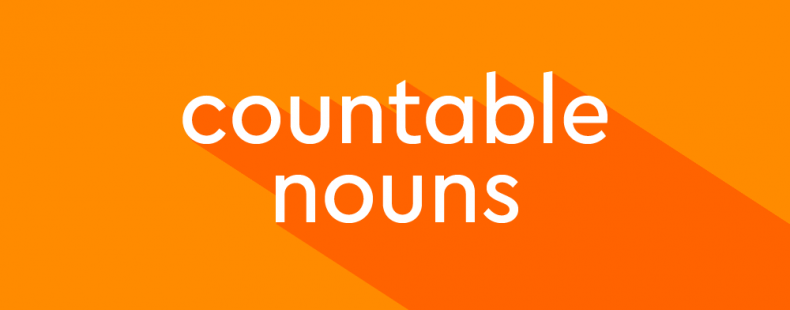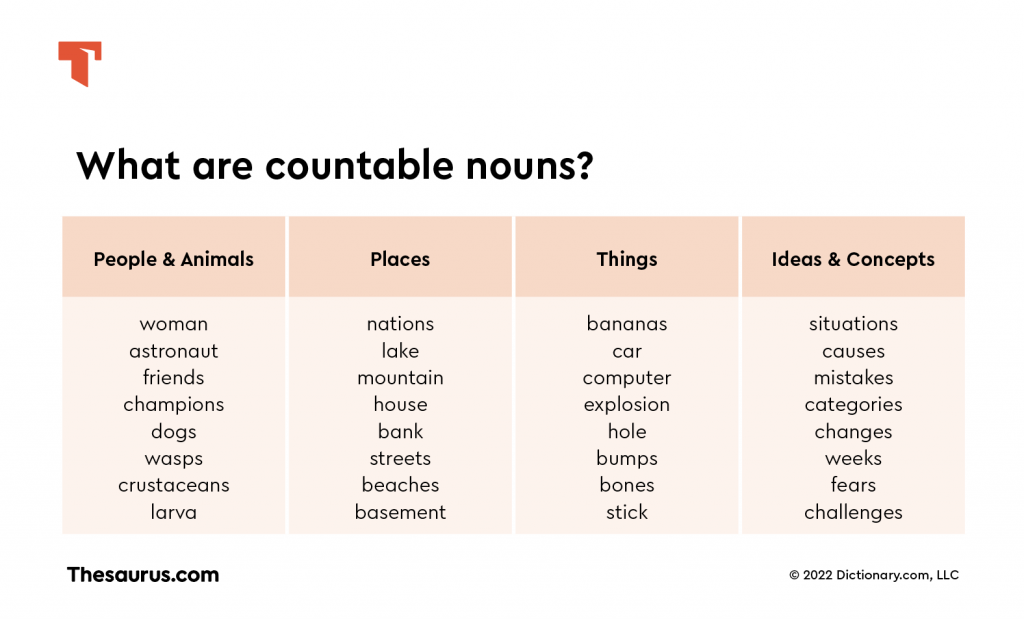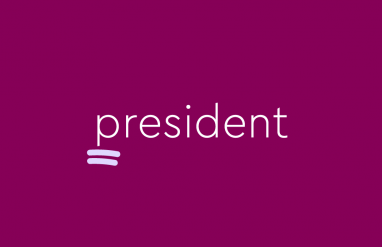During an average day, you probably see a lot of interesting things. While walking down the street, you might see a dozen cars drive by, some people on the sidewalk, or flocks of birds flying overhead. If you’ve studied your grammar, you probably know that cars, people, flocks, and birds are all nouns. While there are many types of nouns, all three of these particular nouns are of the same type: countable nouns.
What is a countable noun?
A countable noun, also called a count noun, is “a noun that typically refers to a countable thing and that in English can be used in both the singular and the plural and can be preceded by the indefinite article a or an or by a number.”
Basically, if it is possible to count something, that something is referred to by a countable noun. Countable nouns can be either singular nouns or plural nouns. For example, the nouns apple, monkey, and chairs are countable nouns. You can count that you have one apple in a basket, that there are three monkeys at the zoo, or that a concert has 987 chairs.
Something to remember about countable nouns is they almost always use an article when they are singular. For example, you wouldn’t say I found dime or Cat ate food. Instead, you would say I found a dime or My cat ate her food. However, countable nouns can be used alone when they are plural as in I wore shoes or She loves dogs.
Countable nouns may sound simple, but sometimes things can get tricky. Depending on how they are used, some words may be countable nouns in some instances but not in others. For example, the word nickel is a countable noun when it refers to a coin, but it is not a countable noun when it refers to the chemical element. You can have five nickels in your pocket, but we don’t have five nickels in a chemical compound. As another example, the word fly is either a countable noun or a verb (which isn’t a type of noun at all!) depending on context.
Countable noun examples
Like most nouns, countable nouns can refer to people, places, things, and ideas.
People and animals
The words we use to refer to people and animals are all countable nouns. It is possible to count even very small animals and living things like dust mites or bacteria. Remember, countable nouns can be singular or plural.
- People: woman, men, girl, boys, enbies, astronaut, pirates, ninja, friends, people, hero, champions
- Animals: dogs, cat, pet, bird, herd, wasps, swarm, insect, crustaceans, larva, fish
Places
Although you may not typically think of places as being things you can count, it is still possible. For example, you can travel to three islands or drive through five countries as part of a journey.
- Examples: nations, cities, country, state, lake, rivers, mountain, house, rooms, bank, apartment, streets, beaches, basement, closet, bathrooms
Things
When it comes to things, you will need to stop and think if it is actually possible to count something to determine if it will use a countable noun. For example, it is possible to count pineapples but you can’t count milk. You can have four pineapples but you can’t have four milk. Milk is an uncountable noun, which we will address below.
- Examples: bananas, car, computer, explosion, hole, bumps, bones, teeth, stick
Ideas and concepts
This is where things can get really tricky. For the most part, we don’t consider abstract nouns to be countable nouns. Try as you might, you can’t count hunger, happiness, or music. However, some intangible things can be countable even though they don’t exist as material objects. For example, you can have 10 ideas, three goals, or two plans. In this case, you really need to think hard if it makes sense to put a number in front of these words. If it makes sense to slip a number in there, you have a countable noun.
- Examples: situations, causes, experiences, problems, mistakes, answers, alternatives, categories, changes, weeks, years, favorites, fears, challenges, accomplishments, trades
Countable nouns and fewer vs. less
Countable nouns lead us to the heated fewer vs. less debate. In general, we use fewer with countable nouns as in I need to buy fewer apples next time and less with uncountable nouns as in I think the puppy did better with less discipline. However, there are many exceptions to this general rule, such as when referring to distances as in The store is less than three miles away.
The words less and fewer are used interchangeably more and more often in everyday speech (no matter how grammar purists may feel about it—and they often feel very strongly about it).
List of countable nouns
Many different people, places, and things are referred to using countable nouns. Check out all of the many different things we can refer to with countable nouns:
- ambulance, baskets, cranberries, doors, ear, fingers, ghost, hats, ice cube, jackets, key, lemons, mummy, notebooks, ostriches, piano, quarters, racers, satellites, table, uncles, vote, washing machines, x-rays, yak, zombies
The difference between countable & uncountable nouns
In short, a countable noun refers to things that can be counted. Things that can’t be counted are referred to by a different type of noun known as an uncountable noun.
While countable nouns can be preceded by a number or the articles a or an, the same usually can’t be said for uncountable nouns. It doesn’t make sense to say I bought a furniture at the store or She shoveled three snow. Most uncountable nouns are singular nouns, but they can be plural as in services or data.
Let’s see if we can count on you to know the difference between countable and uncountable nouns. Look at each of the italicized nouns in the following sentences and think about whether they are countable or uncountable nouns.
- I bought a new desk for my office.
- I need to buy milk and bread.
- The statue was made of gold.
- Watch out for broken glass.
- Could you please get me a clean glass?
- His grandfather fought in a war.
- War only brings pain and misery.
- I love grammar, and I know how to use nouns.
Write smarter with Grammar Coach
We’ve got a noun for you: genius! And that’s what you’ll be when you check your writing on Thesaurus.com’s Grammar Coach™. You can count on this tool, which uses machine learning technology uniquely designed to catch grammar and spelling errors. Its Synonym Swap will find the best nouns, adjectives, and more to help say what you really mean, guiding you toward clearer, stronger, writing.
Answers: 1. Countable, countable 2. Uncountable, uncountable 3. Countable, uncountable 4. Uncountable 5. Countable 6. Countable 7. Uncountable, uncountable, uncountable 8. Uncountable, countable















